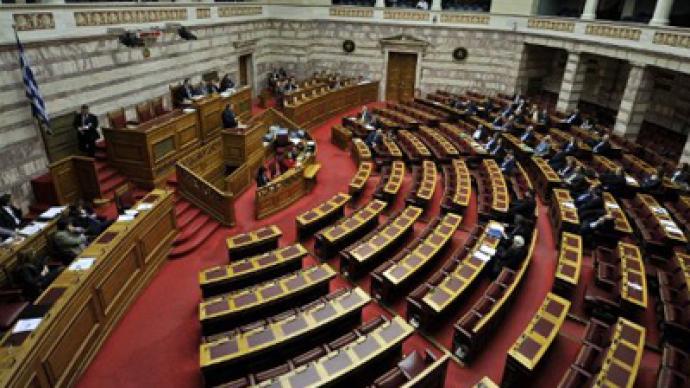‘Greek coalition talks will likely result in another election’ - sociologist

Greece may be in for a long period of political wrangling over the governing coalition's makeup, as recent elections failed to deliver any party a clear majority. RT discussed the situation with Greek sociologist Costas Panayotakis.
RT: What are the chances of an agreement being reached – could this all go to another election?Costas Panayotakis: I think that another election is the likely result, although the political situation in Greece is in flux, so nobody can make any safe predictions. It will now be up to the leader of the Socialist Party, which was the third party in parliament to make an effort to form a government, which would enjoy the support of a majority in parliament. And if that doesn’t work, then the president would call all the political leaders to discuss whether they could find a way [to] form a government. And if that doesn’t work, then there will probably be an election in June. RT: The neofascist party Golden Dawn managed to win around six per cent of the vote. Is this an indication that ultra-right nationalism is gaining ground in Europe as a whole?CP: I think this is a disturbing development. In times of crisis, the extreme right often tries to manipulate and funnel people’s anger by scapegoating immigrants or minorities. So this is certainly disturbing and I think part of the vote was a protest vote of people who were sick of mainstream parties. And hopefully, as the limelight focuses on the Golden Dawn party, it will become less shadowy and people will really see what they stand for and hopefully support for them will go down. RT: If Greece were to abandon the bailout and quit the Eurozone, what would be the consequences for the country?CP: Abandoning the bailout doesn’t necessarily mean that Greece would have to quit the Eurozone. This is the threat that is being used by the pro-austerity parties and by the Europeans, but the Greek Radical Left Coalition, which is an anti-austerity movement, is betting on the fact that the domino effect would be so large for the rest of Europe if Greece were to be exacted that ultimately the Europeans would have to renegotiate a solution that was viable and more socially just for Greek citizens. RT: What about the impact for Greece itself? Wouldn’t it go bankrupt if it rejected the bailout? Would it have to exit the Eurozone then? CP: This is debatable. Nobody knows what would really happen. The Conservatives and the Socialists agree with that analysis. The other sides support a moratorium on the payment of the debt, and they argue that the catastrophe has already arrived in Greece, with unemployment over 20 per cent and anger and desperation growing. They say that this recipe has not worked for Greece, so the alternative is to try something different. Austerity is not the solution, it’s part of the problem.















